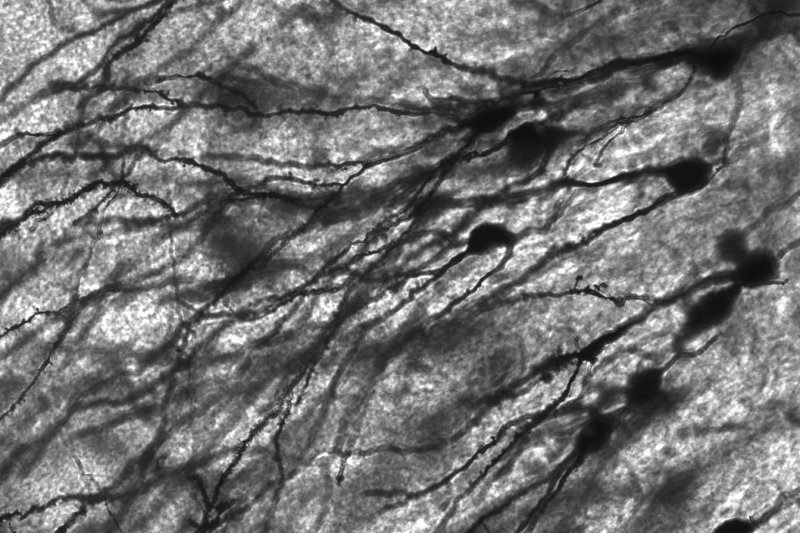Neurons, or brain cells, that become stressed or senescent with aging could be a treatment target for Alzheimer's disease, according to a new study. Photo by MethoxyRoxy/
Wikimedia Commons
Dec. 10 (UPI) -- Researchers Friday said they have identified a rare, but potentially toxic, cell population called "zombie cells" in brains of people who died with Alzheimer's disease.
These stressed cells, called senescent cells, accumulate in tissues throughout the body alongside advancing age, leading to chronic inflammation and disease, the researchers said in an article published by the journal Nature Aging.
The discovery of senescent neurons, or brain cells, in those who have died with Alzheimer's could provide a key target for drugs designed to treat the disease, which is the most common form of dementia, they said.
"To stop dementias, we need to know the cause and the exact mechanisms of [their] development," study co-author Habil Zare told UPI in an email.
"We still do not know the [level] of senescent neurons in developing dementias, [but] if they have a big effect, then removing them or reducing their toxic effects may prevent damage to the brain," said Zare, assistant professor of cell systems and anatomy at the University of Texas Health Science Center at San Antonio.
About 6 million people in the United States have been diagnosed with Alzheimer's disease, which causes progressive memory loss and cognitive decline, according to Alzheimer's Association.
Although no cure exists, recent studies have found that existing drugs, such as sildenafil, sold as Viagra, could help slow progression of dementia because of their effects on tau proteins.
Alzheimer's is caused by the buildup of beta amyloid and tau proteins in the brain, research suggests.
For this study, Zare and his colleagues analyzed roughly 140,000 cells of 76 brains collected as part of the Religious Orders Study/Memory and Aging Project, which are ongoing studies of aging and dementia that include organ donation at death.
They confirmed the findings in these cells using brains of adults who died with Alzheimer's and had various levels of beta amyloid and tau accumulation, collected by the South Texas Alzheimer's Disease Research Center.
About 2% of the collected cells were senescent, and appeared with the tau-containing neurofibrillary tangles that likely play a role in the development of Alzheimer's disease, the researchers said.
Drugs targeting or removing senescent cells from other parts of the body to treat various diseases are already in use and many more are in development, study co-author Miranda E. Orr told UPI in an email.
Examples include the allergy and asthma treatments fisetin and quercetin, which target senescent cells in the lungs, and some cancer drugs in development.
Treatments that target these cells in the brain could help reduce the effects of tau accumulation, slowing the progression of Alzheimer's, she said.
"This therapeutic strategy has been shown to be safe in Phase I clinical trials, which means that clinical testing can, and will, move quickly for people with Alzheimer's disease," said Orr, assistant professor of gerontology and geriatric medicine at Wake Forest University in Winston-Salem, N.C.
"Senescent cell-targeting therapies help to remove dysfunctional cells that are causing inflammation and disease. Eliminating the stressed cells may reduce tau, but [this] needs to be determined in trials," she said.
Based on the findings, the Alzheimer's Drug Discovery Foundation is providing support for a Phase 2 clinical trial to test the effects of clearing senescent cells in older adults with mild cognitive impairment or early-stage Alzheimer's.
"This is especially exciting for the field as we now know we will need drugs that work against the many underlying biological process that go wrong as we age," the non-profit's founding director and chief science officer Dr. Howard Fillit said in a statement.















